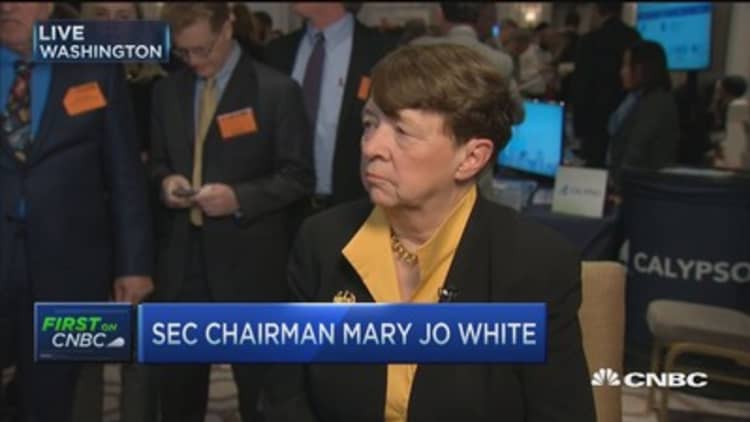
Securities and Exchange Commission Chair Mary Jo White on Tuesday defended the agency's progress on creating a uniform rule for fiduciary duty.
The commission has yet to present new rules to harmonize the differing standards that govern how retail brokers and asset managers offer investment advice. The issue has been on the SEC's desk for years, and White said she supported crafting such a rule in March.
"One has to recognize that this is complex, not quick rule making. It's very important to get it right and to calibrate it so that you have the intended positive objective achieved, but without impacts that could be negative," she said in an interview on CNBC's "Squawk on the Street."
Read More
The SEC staff is working hard to prepare the recommendation for discussions with the commissioners, she added.
"We're full-out engaged with the effort," she said.
The rule would coordinate disjointed standards of care between investment advisers, who must act in a client's best interest, and brokers, who are held to a lower "suitability" standard.
Some academics and critics say these different legal standards may confuse investors and fuel conflicts, because brokers may be inclined to sell products that benefit their bottom lines even if they are not the best choice for their clients.
The Labor Department has proposed rules that aim to reduce conflicts of interest and ultimately cut back on the fees charged to investors by holding retail brokers to a higher "fiduciary" standard, meaning they would be required to put their client's financial interests first.
Read More Mom and pop crowdfunding for startups is about to become a reality
White said the SEC staff has provided technical assistance to the department and would look closely at how it proceeds with its rule.
The SEC and the Labor Department are governed by different laws and are able to act independently of one another, but many of the same asset managers including Wells Fargo, Charles Schwab and Raymond James would be covered by both rule sets.
Critics, including many Wall Street trade groups, have decried the Labor Department's actions, saying the SEC is the more expert regulator and should take the lead.
—Reuters contributed to this story.


